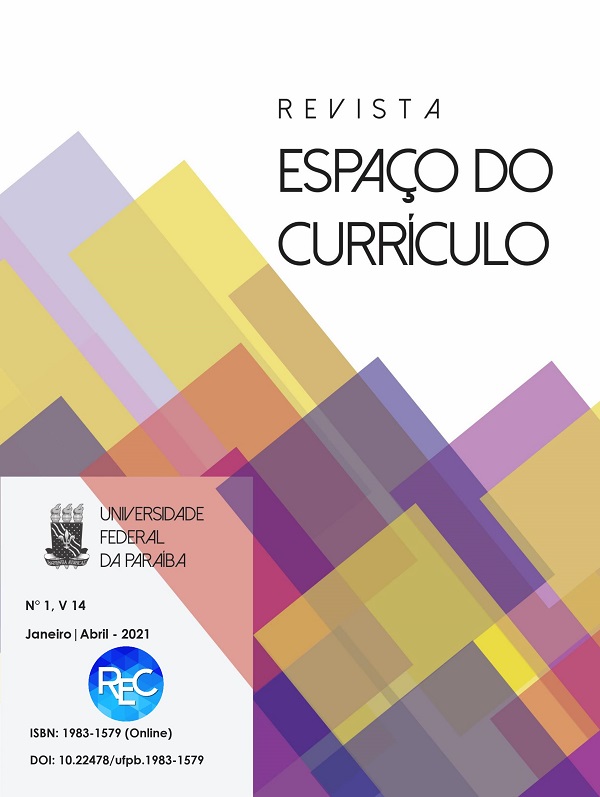THE PRODUCTION OF MULTICULTURAL AND DECOLONIAL CURRICULUMS IN THE PEDAGOGY COURSE BY THE BLACK CINEMA OF ZÓZIMO BULBUL
DOI:
https://doi.org/10.22478/ufpb.1983-1579.2021v14n1.54573Keywords:
Black Cinema, Teacher Training, Multicultural Paradigm, Decolonial PedagogyAbstract
Abstract: This article aims to present the reconstruction of other knowledge in the Pedagogy course through the black cinema of Zózimo Bulbul by proposing the exhibition and production of activities based on the film Alma no Olho. The theoretical foundation was supported by the Multicultural Paradigm and Decolonial Pedagogies in order to develop knowledge for the diversities enunciated by the participating teacher and students. The methodologies used were Action Research and Creative Analysis. In the end, the investigation showed the construction of knowledge provided by the corporeal, aesthetic and historical interrelationships of the film with the perceptions and experiences of the students.
Downloads
Metrics
References
ALMA no olho. Direção: Zózimo Bulbul. Rio de Janeiro – RJ, 1974. 12 min
BARBIER, R. A Pesquisa-Ação. Brasília: Liber, 2007. Tradução de Lucie Didio.
BERGALA, Alain. A hipótese cinema. Pequeno tratado de transmissão do cinema dentro e fora da escola. Rio de Janeiro: Booklink, 2008.
BRASIL. Base Nacional Comum Curricular. Brasília: MEC, 2017. Disponível em: http://basenacionalcomum.mec.gov.br/images/BNC C_20dez_site.pdf. Acesso em: 22 de dezembro de 2017.
BRASIL. Diretrizes Curriculares Nacionais para a educação das Relações étnico-raciais e para o ensino de História e Cultura Afro-Brasileira e Africana. Brasília, 2003.
BRASIL. Ministério da Educação. Proposta para Base Nacional Comum da Formação de Professores da Educação Básica. 2018b.
CANEN, Alberto; IVENICKI, Ana. Metodologia da Pesquisa: rompendo fronteiras curriculares. Rio de Janeiro: Editora Moderna. 2016.
CANEN, Ana. A pesquisa multicultural como eixo da formação docente: potenciais para a discussão da diversidade das diferenças. Ensaio, v.16, n.59, p. 297-308, abr/Jun. 2008.
GOMES, Nilma Lino. Relações étnico- raciais, educação e descolonização dos currículos. Currículo sem Fronteiras, v.12, n.1, p. 98-109, Jan./Abr. 2012.
GOMES, Nilma Lino; JESUS, Rodrigo Ednilson. As práticas pedagógicas de trabalho com relações étnico-raciaisna escola na perspectiva da Lei 10.639/2003: desafios para a política educacional e indagações para a pesquisa. Educar em Revista, v. 47, p. 19-33, jan/mar. 2013.
HALL, Stuart. Da diáspora: Identidades e Mediações Culturais. Belo Horizonte: Editora UFMG, 2003.
HOOKS, bell. Ensinando a transgredir: a educação como prática da liberdade. Tradução de Marcello Brandão Cipolla. São Paulo: Editora WMF Martins Fontes, 2013.
HOOKS, bell. Olhares negros: raça e representação. Tradução de Stephanie Borges. São Paulo: Elefante, 2018.
MACEDO, Elizabeth; RANNIERY, Thiago. Políticas Públicas de currículo: diferença e a ideia de público. Currículo sem Fronteiras, v. 18, n. 3, p. 739-759, 2018.
MIRANDA, Cláudia. Currículos decoloniais e outras cartografias para uma educação das relações étnico-raciais: desafios político-pedagógicos frente à Lei n. 10.639/2003. Revista da ABPN , v. 5, n. 11, jul.– out , p. 1.00-118, 2013.
MIRANDA, Cláudia; RIASCOS, Fanny Milenna Quiñones. Pedagogias Decoloniais e Interculturalidade: Desafios para uma Agenda Educacional Antirracista. Educação em Foco, Juiz de Fora, v.21, n.3, set. / dez., p. 545- 572, 2016.
THIOLLENT, Michel Jean Marie; COLETTE, Maria Madalena. Pesquisa-ação, formação de professores e diversidade. Acta Scientiarum. Human and Social Sciences Maringá, v. 36, n. 2, Jul-dez., p. 207-216, 2014.
WALSH, C. Interculturalidade Crítica e Pedagogia Decolonial: in-surgir, re-existir e re-viver. In: CANDAU, V. M. (org.) Educação intercultural na América Latina: entre concepções, tensões e propostas. Rio de Janeiro: 7Letras, 2009.
Downloads
Published
How to Cite
Issue
Section
License
Copyright (c) 2021 Curriculum Space Journal

This work is licensed under a Creative Commons Attribution 4.0 International License.
By submitting an article to Curriculum Space Journal (CSJ) and having it approved, the authors agree to assign, without remuneration, the following rights to Curriculum Space Journal: first publication rights and permission for CSJ to redistribute this article. article and its metadata to the indexing and reference services that its editors deem appropriate.
















